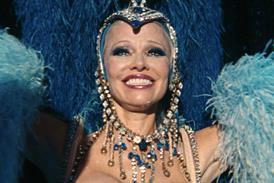Dir: Lin Cheng-sheng. Taiwan. 2003. 90mins
For this contemplative, static portrait of a successful Taipei real estate dealer, unhappy with his life and his career but unable to make a decisive move elsewhere, director Lin Cheng-sheng - never one to rush proceedings - seems to have slowed to a crawl. The crisp, crystal-clear images, judicious selection of sets and locations and sympathetic cast, headed by one of Taiwan's most popular male stars, Leon Dai, may paint an accurate still-life portrait of an entire generation living in an emotional vacuum. But it is still not enough to tell a story. The film played in Un Certain Regard at Cannes.
Robinson (Dai), a maverick in the real estate business, runs a partnership with two young women, Billie (Yang Kuei-Mei) and Hsui Ling (Chen Shian-Chyi) and another friend, Benny (Wu Kuei-Chuen). They are all of the same generation - born and raised in Taiwan, adept at making money fast, yet emotionally alienated by their occupation. Robinson, even more than the others, rejects commitment of any kind and has no possessions other than his portable computer, his mobile phone and a goldfish he takes along with him as he moves from one five-star hotel to another, in the pursuit of the next deal.
His girlfriend would like a stable relationship, but Robinson cannot handle the commitment. He has a family in San Francisco he has not seen for ages, and his friendships stop the moment he is expected to invest more than passing attention to another person. His only dream is to make his first million and acquire an isolated island called Crusoe in the Caribbean, then retire there away from all the hassle of having to deal with other people. In short, he is the opposite of Defoe's Robinson Crusoe, who yearned to leave his island and return to his home. And that is about all.
The film follows Robinson through his routines, from the hotel to the office, from the office to a building site, then back to the hotel for an encounter and eventual tryst with his girlfriend, a glance at the island of his dreams on the computer screen and, once in a while, a visit to an old acquaintance who has dropped out of the rat race to operate a small bar on the outskirts of town.
All along, there are remarks about the soon-to-be-forgotten mainland roots of many Taiwanese - the generation gap and the changing face of the city; the youthful aspirations of the present generation discarded for the loneliness of the long-distance business career; and learning to face the fact that there will be no one to share a future with. It would have been nice to find a plot of some kind to tie all these notes together, but for some reason, if there ever was such a thing, it was obviously removed. Practically all the female characters in the film, judging by their appearance and their brief scenes, seem to have much more to deliver than the script or the editor would allow them, while the references to the booming building industry and its criminal underbelly are never truly developed.
Lin Cheng-sheng's films have always had the tendency to suggest rather than tell stories, but this time he has gone just a bit too far. Dealing with the kind of material that directors such as Edward Yang have done miracles with, he seems to be looking in the right direction but still trying to make up his mind about what he wants to say.
Prod co: Central Motion Picture Corp
Int'l sales: Celluloid Dreams
Prods: Huang Lin-shyang, Chiu Shun-ching
Scr: Lin Cheng-sheng
Cinematography: Han Yun Chung
Ed: Chen Hsiao Dong, Ko Su-ching
Prod des: Hsia Shao-yu
Music: Lin Chung
Main cast: Leon Dai, Yang Kuei-Mei, Chen Shian-Chyi, Chang Feng-shu, Lee Sin-Je, Wu Kuei-Chuen



















No comments yet